|
– Part 2 –
| THE TWO FACES OF DR. JEKYLL (1960) |
|
Robert Louis Stevenson’s gothic novella The Strange Case of Dr. Jekyll and Mr Hyde is, you may not be surprised to learn, one of the most popular stories for stage and screen adaptation, of which there have, according to the novella’s Wikipedia page, been at least 120 versions to date. So famous is the story that the names Jekyll and Hyde have become part of everyday language and are commonly used to describe anyone who displays two extremes of behaviour. Where this fame disadvantages any film adaptation, at least when viewed from a modern perspective, is that most audiences will be familiar with the essentials of the plot even before it starts, and as soon as we are introduced to Dr. Jekyll we know it’s only a matter of time before he ingests the self-made formula that will transform him into the dastardly Mr. Hyde. There are thus only three initial questions most viewers will have about film adaptations of the story. How will the film handle the transformation from Jekyll to Hyde? What physical form will Hyde take? And just what level of chaos and destruction will this dark personality-change unleash?
Hammer’s first serious adaptation on the story, The Two Faces of Dr. Jekyll (the 1959 The Ugly Duckling was a comical take on the tale), gets off to a shaky start. The problem, which is amplified by our foreknowledge of the physical transformation that is soon to take place, is Jekyll himself, who frankly looks like Hyde in a poorly executed disguise. Everything about the man looks almost comically false, from his pasted-on beard, moustache and eyebrows to his stiff delivery, robotic posture and put-on deep voice. I almost expected him at one point to say, as he looked suspiciously side-to-side without moving his head, “No, I’m not the man you’re looking for. You must be mistaking me for someone else. Now I’m sorry but I have to leave and go attend to my begonias.” I understand that there was a need to make Jekyll look and sound so different to Hyde that even his own wife wouldn’t recognise him (and I still don’t buy that she wouldn’t), but from the moment I laid eyes on the good doctor I found myself wondering if I was actually supposed to believe that all that facial hair was real. It doesn’t help that the first time we encounter him making clinically cold-hearted remarks about the deaf children he allows to play in his garden, it sounds very much as if his voice was re-recorded in post-production, which only adds to the character’s sense of fakery. That Jekyll is meant to come across as dull and bookish is fair enough, but as portrayed here by actor Paul Massie, he has all the emotional expression of a lab-created automaton. If this all reads like the opening cannonade of a spectacular trashing of the film on my part, then I feel obliged to say up front that I enjoyed The Two Faces of Dr. Jekyll and that there are many things in it worthy of recommendation. It’s just that Dr. Jekyll isn’t one of them. I’ll get to Mr. Hyde in a minute or two.
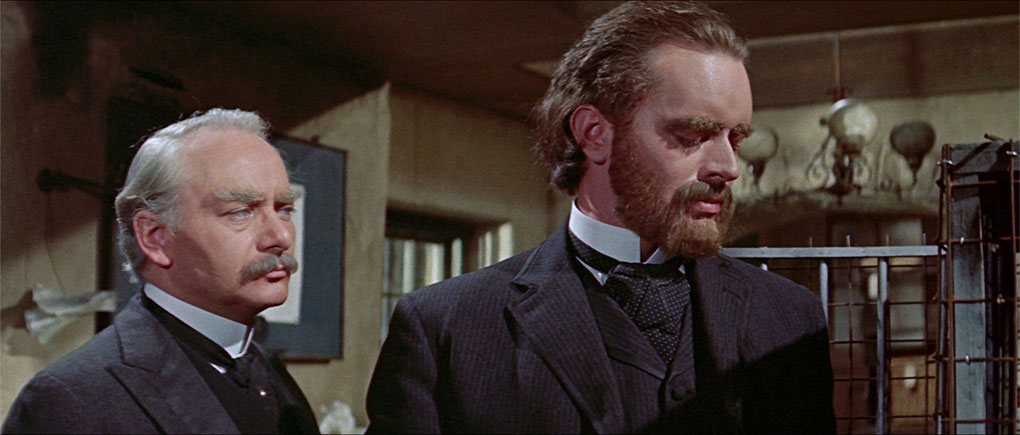
As the film begins, Dr. Henry Jekyll is in conversation with his medical colleague Dr. Ernst Litauer (David Kossoff), who is a little concerned about the direction Jekyll’s work is taking after witnessing the effects of his new formula on a monkey. And be warned, this is one of those ‘what the hell did they do to make the animal behave like that?’ scenes that you'd be unlikely to dind in a film made today. They’re interrupted by Jekyll’s attractive wife Kitty (Dawn Addams), who informs her husband that his pesky friend Paul Allen (Christopher Lee) is here again looking to borrow more money to feed his gambling debts. She thinks Henry should tell Allen to sling his hook, but as ever Jekyll seems willing to entertain and assist him. Kitty thus returns with the sternest of faces to confront the leeching Allen, and this is where the film takes its first interesting turn, as it quickly becomes clear that Allen and Kitty are having an affair. And if you think this lays the path for Hyde to become a fearsome defender of Jekyll’s wounded pride then you’ll likely be in for few more surprises.
When Kitty announces that she will be attending a society ball that evening and dismisses her husband’s suggestion that they spend the evening together at home, a dejected Jekyll decides to try his new formula on himself, which in a move that probably has subtextual meaning, he injects instead of drinks. Surprisingly, given director Terence Fisher’s use of dissolves for transformation effects in Dracula, Jekyll’s switch to Hyde is not shown on screen at all, with Fisher instead opting to surprise us with the first appearance of Hyde when he turns his head after leaving his laboratory. Except it doesn’t, largely because the only possible reason for Jekyll’s patently false facial hair is that it’s going to disappear when he turns into Hyde. Quite where it vanishes to and reappears from when he switches back to Jekyll is anyone’s guess.
In the second interesting turn, Massie’s Hyde is not the animalistic creature of previous film adaptations but a self-confident dandy with a sadistic streak, the polar opposite of the unsociable bore of his original form. We get our first good look at his transformed personality when he by chance visits the same nightclub in which Kitty and Paul are romancing and bickering. Here he dances with a flirty woman who expects him pay for the privilege, only to forcefully cast her aside when he catches sight of Kitty and Allen. Instead of smacking Allen up as expected, however, he introduces himself as a friend of Jekyll’s and is promptly asked to join them, and after Kitty huffily leaves, Jekyll and Allen start to hit it off like the friends they technically once were. A short while later the scorned woman’s pimp (a young Oliver Reed in his first role for Hammer) walks over and threatens Hyde for money, to which Allen responds by punching him out, a move that Hyde follows through on by beating him repeatedly over the head with a goblet. This, it turns out, is only a taste of things to come.
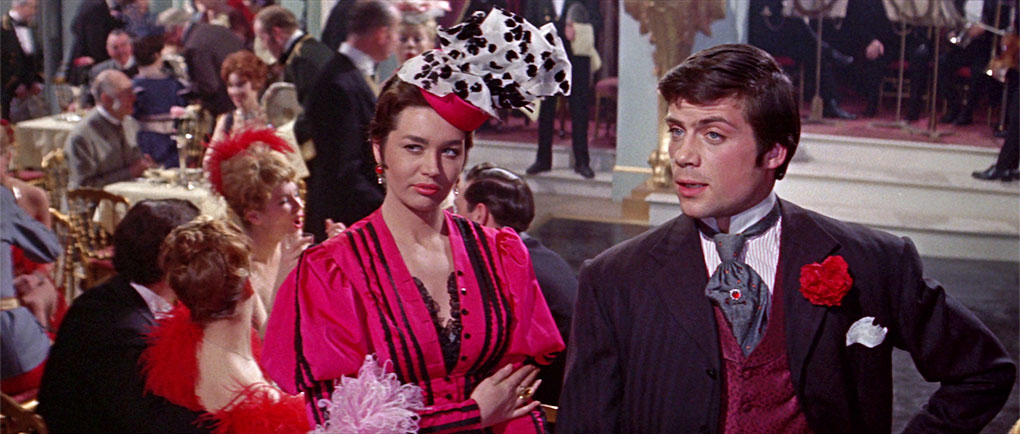
The Two Faces of Dr. Jekyll is a curious concoction, one whose ideas and ambition are not always matched by their execution. And its ideas, courtesy of The Day the Earth Caught Fire co-screenwriter Wolf Mankowitz, are of considerable interest, extending beyond the story’s familiar exploration of duality to explore the nature and effects of Victorian decadence (and, by association, how that is echoed in the mores of contemporary society) and the shape of repressed desire. To this end, the film pushes some surprisingly risky buttons, with Hyde following Allen’s lead on hedonistic indulgence, which at one point has them stoned in an opium den and ultimately sees Hyde romancing and eventually raping his own wife. The film’s sexual overtones, meanwhile, are at their most explicit in the character of cabaret belly-dancer Maria, whom Hyde seduces and sleeps with and whose stage performance features a python that she dangles suggestively between her legs and whose head she inserts in her mouth in a blatant suggestion of fellatio, a move that almost prompts the watching Hyde to orgasm on the spot. It’s hardly surprising that the film became a target for cuts on both sides of the Atlantic, all which have been thankfully restored for this release.
Visually, the film is sumptuous, with what looks like half of the budget spent on some ravishing costumes and sets, both of which are showcased well by Jack Asher’s gorgeous scope cinematography. What scuppers things a little is the aforementioned Paul Massie, who for my money is miscast in a role that I have no doubt Christopher Lee could have worked wonders with (he wanted the part and did eventually get to play it in the 1971 Amicus production, I, Monster). As Jekyll, Massie is stiff and inexpressive, while as Hyde he tends to play to the gallery, bulging his eyes and overplaying his delivery. It’s not without its pleasures, but particularly when pitted against Lee’s commanding performance as Paul Allen or Dawn Addams’ vibrant confidence as the seductive Kitty, he tends to feel as if he’s strayed in from a different movie.
It’s hard to be sure whether The Two Faces of Dr. Jekyll was an early attempt by Hammer to make take the films for which the studio was already famous in a different direction, or a failed stab at kicking off another franchise. Either way, it ultimately led nowhere. At a time when Hammer’s gothic horrors were doing gangbuster business, this was a rare box-office flop, not helped by the enforced cuts, a reshot ending and the fact that even after being censored for the American market, Columbia chose not to distribute the film and sold it off to American International Pictures, who retitled it Jekyll’s Inferno and then cut it down to 80 minutes and re-released it as House of Fright. Presumably as a result, it was to be another 11 years before Hammer revisited Stevenson’s story with the 1971 Dr. Jekyll and Sister Hyde, an even more adventurous take on the story and that for my money is one of the best of the studio’s later genre titles.
A rather lovely 2.35:1 transfer with a wonderfully rich colour palette that really flatters the costumes, the lighting and the art direction. The contrast is very nicely balanced with solid black levels but no harshness to the image, and a fine film grain is visible, and no sign of dust or damage.
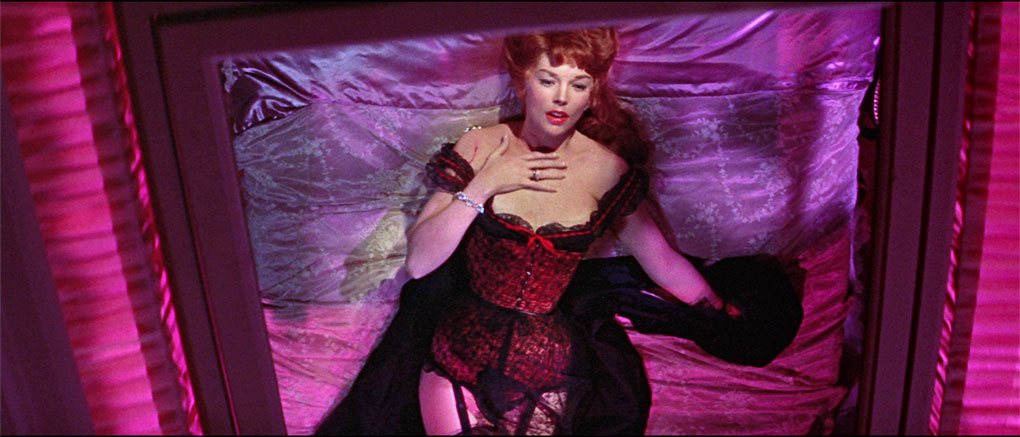
The Linear PCM 1.0 mono soundtrack is also in very good condition, having a fuller feel to the audio than expected, which gives the dialogue and music more life. There’s no trace of background fluff or damage.
Optional English subtitles for the deaf and hearing impaired are available.
Audio Commentary with Josephine Bottin and Jonathan Rigby
An unsurprisingly strong commentary from old hands Josephine Bottin and Jonathan Rigby, both of whom are absolutely in love with the film’s costumes and take every opportunity to compliment them. They discuss the film’s themes, provide information on the actors (including more than you might expect on some of the bit part players), and praise Jack Asher’s lighting camerawork, Bernard Robinson’s production design, and Wolf Mankowitz’s screenplay and its underlying themes. Rigby also says he rather likes the look of Jekyll in the film’s opening scene. Really?
Identity Crisis: Inside The Two Faces of Dr. Jekyll (18:48)
The second of the Marcus Hearne featurettes is built around interviews with Jonathan Rigby, Kevin Lyons and Alan Barnes, and aside from my gripes about the irritating ping-pong editing of some of the interview clips, this is an engaging piece whose contributors are as honest about the film’s weaknesses as they are about its strengths. They share my issues with Paul Massie’s central performance and admiration for Christopher Lee’s, and also highlight the unconvincing nature of Jekyll’s stick-on beard, as well as wondering where it goes when he transforms into Hyde. They also discuss the originally planned ending and why it wasn’t shot, and suggest that there’s a good film – or better still, a good stage play – in there trying to get out.
Hammer’s Women: Dawn Addams (10:13)
British cinema expert Laura Mayne looks at the career of actor Dawn Addams and her performance as Kitty in The Two Faces of Dr. Jekyll and her character’s role in the narrative.
Paul Massie: Archival Interview (9:32)
An audio recording of an interview conducted with leading man Paul Massie in 1967 by amateur filmmaker and Hammer fan Robert Blenheim, which is illustrated with stills and posters that have all been given the Ken Burns zoom and pan treatment (that’s not a complaint – this is a standard approach that I regularly use when I only have static images to work with). And it’s really good. Massie himself is a gracious and engaging interviewee, recalling interesting details about his work on the film and even an accident with the fiery climax that threw flames into his face and prompted some serious cursing. He laughs when Blenheim reveals that some of the dialogue was redubbed for the American market, and thinks the idea behind the film was brilliant but that it didn’t really come off.
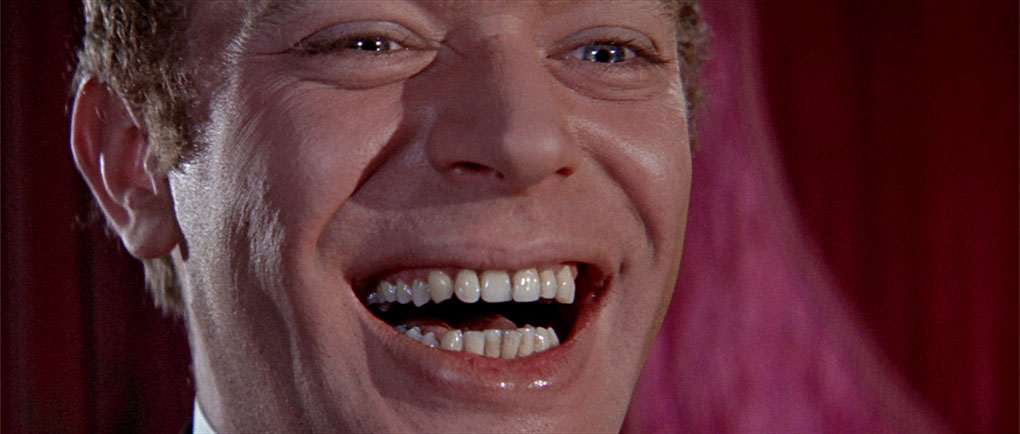
Wolf Mankowitz: Now and Then (31:36)
One of the 330+ interviews conducted by Canadian broadcaster Bernard Braden (the BFI have included some of these on past disc releases) for a project that was never ultimately realised, this interview with screenwriter Wolf Mankowitz focuses not, as expected, on his film career, but on his Jewish heritage, his spiritual connection to Israel, and his clear contempt for Arabs who have issues with anything the State of Israel does or says. Given the merciless land-grabs and treatment of the Palestinian population in the West Bank in recent years, this leaves a bit of a sour taste, but is still of historical and cultural interest.
Mauve Decadence: Huckvale on Norman (10:23)
Here David Huckvale looks at the career of composer Monty Norman and his work on a film that he cannily describes as a study of decadence. He picks up on something I had written in my viewing notes when he notes that the opening title music plays like the overture to a musical, and suggests that the film plays at times like an adaptation of Oscar Wilde’s A Picture of Dorian Gray.
The Many Faces of Dr. Jekyll (6:50)
Despite the script being vetted by the BBFC prior to production, the finished film still prompted demands for cuts on both sides of the Atlantic, and with the film being presented on this disc in its original uncut form, the imposed cuts are shown and compared side-by-side here with the uncut version. Some are not surprising, as even I wondered how the hell the snake-head-in-the-mouth shot could have made it onto cinema screens back in the day. More surprising are the almost comically puritanical alterations made to the dialogue for American distribution, with “I told you to go to hell and take that trollop with you” redubbed “I told you to go to Hades and take that woman with you,” and suchlike. I love extras like this.
UK Theatrical Trailer (2:27)
“If you cannot bear to see a man change before your eyes, then shut them for just a few seconds, if you can,” barks the urgent voice of a narrator who presumably hasn’t been informed that Jekyll’s transformation into Hyde is never shown in the film.
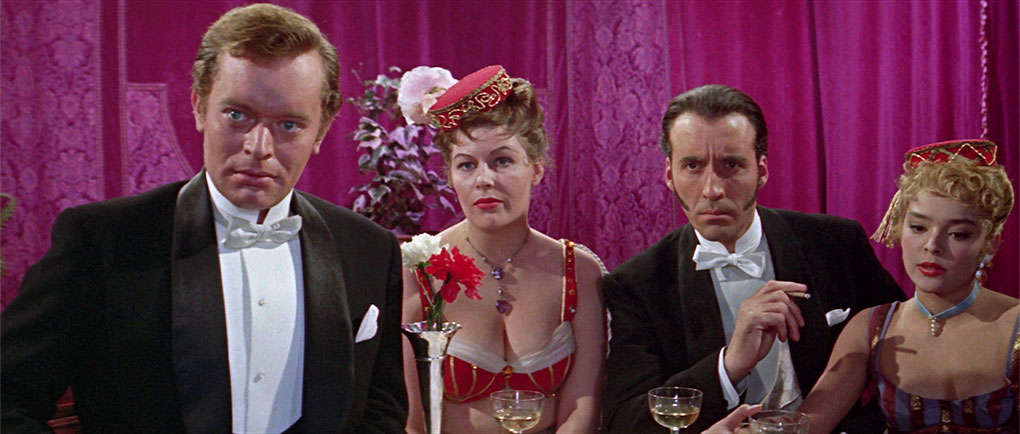
Sam Hamm Trailer Commentary (3:12)
Screenwriter Hamm praises the notion of a dashing Edward Hyde and Christopher Lee’s performance, as well as noting that by getting off with Hyde, Kitty is technically unfaithful to her husband with her husband.
Image Gallery
119 screens of promotional stills, posters and press book scans.
Booklet
This one kicks off begins with a fascinating deconstruction of elements and themes within the film by Kat Ellinger, who clearly holds it in higher regard that I do but makes her case so persuasively that I momentarily considered changing my vote. Extracts from Columbia’s campaign book follow, after which we have snippets from the British and American press books that focus on the main cast. Bringing up the rear are extracts from three contemporary reviews – in one written for the Illustrated London News, Alan Dent makes a retrospective tit of himself by suggesting that the film was far superior to the other title he covered that week, which was John Cassavetes’ game-changing Shadows.
< previous | next >
The Revenge of Frankenstein | Taste of Fear | The Damned
|